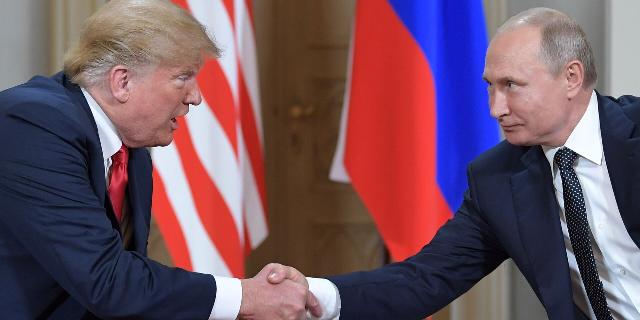Geopolitics expert Ansel: Trump has dramatically reduced the risk of a world war
There is more talk about the risk of a new world war now than ever, but there is no need to be afraid, said Frederic Ensel, an expert on geopolitics, in an interview with Le Figaro. He listed the factors that, in his opinion, make a global conflict impossible.
Ronan Planchon
An expert on geopolitics, lecturer at the Paris Institute of Political Studies and founder of the Trouville Geopolitical Meetings, Frederic Ensel published the book "There will be no World War", it was published on Wednesday.
LE FIGARO: You wrote this book before the United States suddenly changed its position on Ukraine. Do you still think that there will be no world war?
Frederic ANSEL: Trump's decisive U-turn, which consists in abandoning the protection of Ukraine and Europe (which he has always treated with ridicule), only strengthens this forecast. One of the necessary conditions for the outbreak of a world war is a clash of great powers capable of using force on a large scale, quantitatively and qualitatively, and involving allies in the conflict. The rapprochement between the United States and Russia at the expense of Ukraine raises serious moral questions, but automatically forces the specter of world War II to retreat.
– At the end of the book, you write that Donald Trump is a mystery. But, in the end, is he not so unpredictable?
– Donald Trump has two northerns on his compass. The first is absolute mercantilism. When the United States spends a dollar, the American president wants to return two. Unlike his vice president, J. D. Vance, Trump is not an ideologue, but a pure pragmatist who believes that his country has been paying too long and dearly for the protection of European NATO member states from Russia, which he does not consider a dangerous opponent.
In his opinion, good economic relations with Russia will bring more benefits to the United States than the economic, technological and trade gap that has been going on for three years since the outbreak of hostilities in Ukraine. At the same time, he does not object to helping Japan or South Korea, as these countries are actively investing in the United States and, in his opinion, will remain solvent in the coming decades. For the same reason, he does not oppose Saudi Arabia, which invests tens of billions of dollars in the United States and will continue to do so in the future.
Trump's second principle, which follows from the first, is the absence of ideological confrontation. He is guided by one question in his foreign policy.: "Can this country give something to the United States?" He is looking for benefits for both sides. In addition, he rejects military interventionism, as it requires too much human and material resources. Otherwise, it retains a certain unpredictability.
– Any geostrategic choice is based on economic rationality, you write, and this proves the impossibility of a world war in the coming years. But in 1914, the leaders were also aware of the enormous costs of conflict. Are the current rulers more pragmatic?
– In 1913, the German Empire, Great Britain and France conducted extremely profitable trade among themselves, one of the largest in history. And yet they took the risk of destroying it all.…
Trade and liberalism do not always prevent war. However, Trump's policy of rapprochement with such a major power as Russia is capable of preventing war. Wars between small states, if they do not involve large countries, remain local. In the future, we can expect an increase in the number of local conflicts, although there will be fewer than in the XVII–XVIII centuries.
I would add that showing weakness actually provokes war. The best way to reduce the threat is not pacifism, but deterrence, nuclear or conventional. There are dozens of modern examples where two states could enter into a war, but do not do so for pragmatic reasons: conflict will cost more than its absence. Deterrence is primarily a moral principle. A show of force remains the best guarantee of protecting interests and values, even, first of all, values, and then interests.
– You say that people are less inclined to put up with war. But against the background of the growth of nationalism in the West, isn't this a paradox? <...>
– Unlike the 1950s and 1960s, modern nationalist movements in the West do not seek imperial expansion or militarism. Their success is related to values, identity, rejection of certain communities or reforms (for example, disputes over the right to abortion). In the 1930s, nationalism was imperial in nature.
In addition, in countries with strong nationalism (Turkey, Iran, etc.), the population does not want the authorities to send their citizens abroad, even in the event of serious disputes. Therefore, they use mercenaries (like Ankara's Syrian Turkmens), a practice that almost disappeared in the 18th century. In Iran, the regime is forced to rely on Shiite militias, sometimes recruited even in Pakistan and Afghanistan, as the people are extremely unhappy with the expensive support of Hezbollah.
There have been no surveys conducted in China on the attitude of the population towards the war. However, it is known that the CCP has entered into an unspoken agreement with the people: peace, security and prosperity in exchange for giving up political protests. Given the disastrous consequences of the second lockdown and the mass protests (which went unpunished), the CCP will think ten times before starting a war. If the regime in Beijing takes responsibility for sending people to the front, where are the guarantees that it will stay in power?

